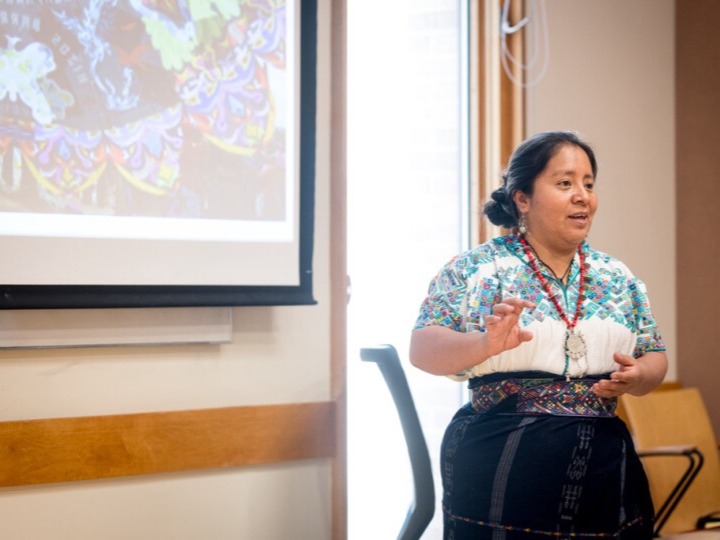Indigenous Languages Initiative

Professor Manuela Tahay teaches the K'iche' Maya language
About the Initiative
The Indigenous Languages Initiative (ILI), under the direction of Professor Karolin Obert, is focused on teaching, researching, promoting, and revitalizing Indigenous languages spoken in parts of Latin America. Classes are taught by experienced native speakers.
The following classes are available in 2025–2026. Scroll down to ILI Language Offerings to view details.
- K'iche' Maya (in person)
- Nahuatl (online)
- Quechua (online)
- Zapotec (online)
ILI is committed to honoring the linguistic breadth of Latin America. While most people in the world speak one of a few major languages, the real linguistic treasure lies in the thousands of Indigenous languages that carry unique worldviews, histories, and ecological knowledge. Latin America alone hosts over 560 Indigenous languages—8% of the world’s linguistic diversity! Through its course offerings and community engagement, ILI supports the vitality of these languages and the communities that sustain them.
Indigenous Language Scholarships, Spring–Summer 2026
LLILAS is pleased to offer tuition waivers during spring and summer 2026 for the study of an Indigenous language of Latin America in combination with one Latin American Studies course. APPLY HERE. The required language course for spring 2026 is K'iche' Maya, taught by visiting professor Manuela Tahay. Submissions will be due on Monday, October 27. Learn more here. Contact us for more information.
Why Learn an Indigenous Language?
- Connect with Living Cultures – Indigenous languages are vibrant, spoken today, and deeply tied to community identity
- Access Unique Worldviews – Many concepts in Indigenous languages have no direct English equivalent, offering new ways of thinking
- Serve Communities Better – Ideal for careers in healthcare, education, and social work; valuable for students in anthropology, linguistics, law, archaeology, and museum studies
- Understand the Land – Indigenous languages encode ecological knowledge vital for sustainability and environmental work
- Support Language Revitalization – Help preserve endangered languages and show solidarity with communities that speak them
Read about some of the educators and native speakers who have contributed to ILI's language offerings.
ILI Language Offerings
LLILAS offers in-person and online instruction in the following Indigenous languages of Latin America. Learn more below.
- K'iche' Maya
K'iche' Maya is spoken by over one million people in Guatemala. Native speaker and renowned K'iche' Maya educator Manuela Tahay Tzaj taught two levels of K'iche' Maya during the 2024–2025 academic year. She also led several cultural workshops, including one with a focus on the art and craft of weaving. Tuition stipends will be available in spring 2026 to study K'iche' in addition to one Latin American Studies class.
Applications due: Monday, October 27, by 11:59 p.m. Central Time
Learn more here. Contact Ramya Iyer for more information. - Nahuatl
Nahuatl is spoken by over one million people, most of whom reside in Central Mexico. During the 2022–2023 academic year, Nahua scholar Eduardo de la Cruz Cruz taught two semesters of Nahuatl at the undergraduate and graduate levels.
- Quechua
With several distinct varieties, Quechua is the most widely spoken Indigenous language in the Andean region of South America. This curriculum teaches the Cusco Collao variant, spoken in Peru.
- Zapotec
Coming soon, an online course in Zapotec, which is a language family spoken in southern Mexico. If you would like to be notified when the course comes online, please contact Professor Karolin Obert.
- Accordion 5Panel 5. Add body text in this space.
